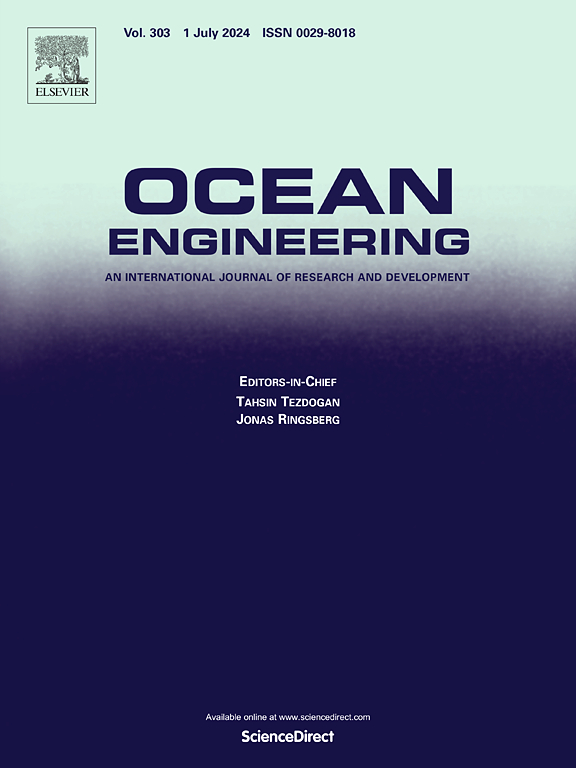基于鲁棒混合视觉伺服的自主水下航行器悬停控制
IF 5.5
2区 工程技术
Q1 ENGINEERING, CIVIL
引用次数: 0
摘要
提出了一种基于混合视觉伺服(HVS)框架的自主水下航行器悬停控制方法,旨在实现自主水下航行器在非结构化水下环境中相对于静态目标的精确稳定姿态调节。该方法在双环控制体系结构中集成了鲁棒H∞控制器,有效地解决了水下图像退化、参数不确定性和非结构化环境中遇到的外部干扰。外环利用水下目标图像矩的视觉特征设计位置控制律,增强了对水下图像退化的鲁棒性。在内环中,设计了一个鲁棒H∞控制器来精确跟踪由外环产生的速度命令,提供对流体动力系数摄动和外部干扰的鲁棒性。通过大量的对比仿真和实验,验证了所提出的悬停控制方法的性能。结果表明,该方法能够实现水下航行器精确稳定的悬停控制,支持非结构环境下水下目标的自主近距离观测。本文章由计算机程序翻译,如有差异,请以英文原文为准。
Robust hybrid visual servoing for hovering control of autonomous underwater vehicles in unstructured environments
This paper presents a novel hovering control method for autonomous underwater vehicles (AUVs) based on a hybrid visual servoing (HVS) framework, designed to achieve accurate and stable pose regulation of AUVs relative to static targets in unstructured underwater environments. The proposed method, which integrates a robust controller within a dual-loop control architecture, effectively addresses underwater image degradation, parameter uncertainties, and external disturbances encountered in unstructured environments. In the outer loop, visual features derived from image moments of underwater targets are utilized to design a position control law, enhancing robustness against underwater image degradation. In the inner loop, a robust controller is designed to accurately track the velocity commands generated by the outer loop, providing robustness against hydrodynamic coefficient perturbations and external disturbances. The performance of the proposed hovering control method is validated through extensive comparative simulations and experiments using an AUV prototype. Results demonstrate that the method enables accurate and stable hovering control of the AUV, supporting autonomous close-range observation of underwater targets in unstructured environments.
求助全文
通过发布文献求助,成功后即可免费获取论文全文。
去求助
来源期刊

Ocean Engineering
工程技术-工程:大洋
CiteScore
7.30
自引率
34.00%
发文量
2379
审稿时长
8.1 months
期刊介绍:
Ocean Engineering provides a medium for the publication of original research and development work in the field of ocean engineering. Ocean Engineering seeks papers in the following topics.
 求助内容:
求助内容: 应助结果提醒方式:
应助结果提醒方式:


